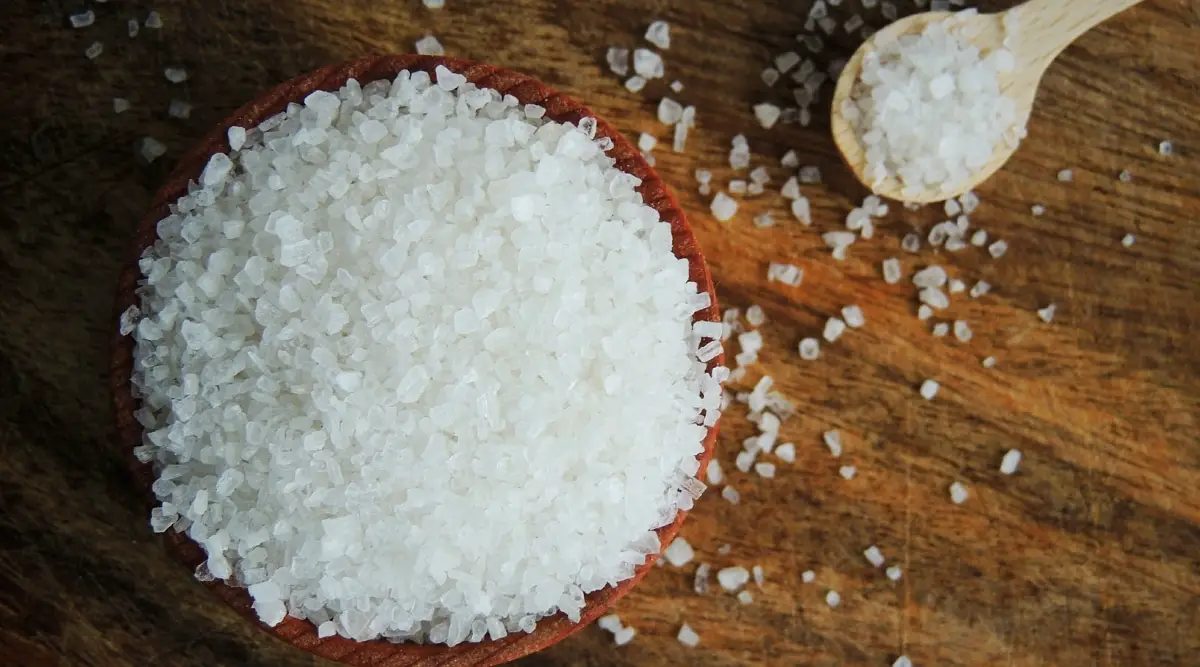While Epsom salt might seem unassuming, this magnesium-rich natural remedy can provide a wide range of health benefits. Epsom salt is a natural exfoliant and anti-inflammatory remedy that can be used to treat muscle aches and dry skin and even fight various internal health issues.
From soothing sore muscles and alleviating stress to promoting skin health and enhancing sleep quality, Epsom salt’s benefits are as diverse as they are astounding.
What Is Epsom Salt?
Epsom salt derives its name from a bitter saline spring located at Epsom in Surrey, England, where the compound was first distilled from water. It was originally prepared from mineral water, but it’s mainly obtained from mining operations today.
Unlike traditional salts that consist of sodium chloride, this mineral compound is magnesium-rich. Epsom salt consists of magnesium and sulfate. In appearance, it looks like tiny, colorless crystals and is similar to table salt.
10 Health Benefits of Epsom Salt
From alleviating stress and promoting relaxation to aiding in detoxification and reducing inflammation, Epsom salt is a versatile and natural remedy that can enhance overall well-being.
- Enhances Magnesium Levels
Maintaining optimal magnesium levels is essential for good health. The mineral is crucial for regulating more than 300 enzymes in the body and is involved in important functions such as muscle control, energy production, transmission of electrical impulses, and detoxification. [1]
Research has linked magnesium deficiencies to various chronic diseases, including type 2 diabetes, Alzheimer’s disease, high blood pressure, heart disease, stroke, and attention deficit hyperactivity disorder (ADHD). By raising internal magnesium levels, you can potentially improve or prevent these health conditions. [1,2,3,4]
When you immerse your body in a bath enriched with Epsom salt, the magnesium ions in the salt can be absorbed through the skin. Once absorbed, the magnesium ions can enter the bloodstream, increasing the body’s internal magnesium levels.
- Alleviates Stress
Research from the University of North Carolina shows that low magnesium levels worsen stress reactions. Magnesium salts, like Epsom salt, can potentially reduce stress and may benefit those with neuropsychiatric disorders. [5]
After a taxing day, a soothing bath can be a great stress-relief option. To enhance the experience, add up to two cups of Epsom salt to your bathwater. Magnesium, found in Epsom salt, can relax your muscles and promote a calmer state of mind.
Magnesium is essential for energy production in cells, and by increasing its levels, you can feel revitalized without experiencing restlessness. It offers a more serene form of energy compared to the invigorating effects of caffeine consumption.
- Detoxifies the Body
Epsom salt contains sulfates that aid the body in detoxification by eliminating toxins, including heavy metals, in cells. When you take a bath with Epsom salt, minerals like magnesium and sulfate enter your skin through reverse osmosis, drawing out salt and dangerous toxins from your body.
Detox baths with magnesium sulfate and baking soda are occasionally suggested as part of a healthy weight loss plan. While Epsom salt doesn’t directly cause weight loss, it can help reduce water retention and support elimination, making it a helpful addition to a holistic weight loss approach.
- Relieves Constipation
Epsom salt is safe and approved by the FDA as a laxative to relieve constipation naturally. A study published in Magnesium Research confirms its powerful laxative effect, which occurs through the release of digestive hormones and neurotransmitters.
To take Epsom salt orally, dissolve one dose in eight ounces of water, stir, and drink it all at once. You can squeeze in some lemon juice to improve the taste. Stay well-hydrated while using Epsom salt as a laxative to prevent dehydration. It typically induces a bowel movement within 30 minutes to six hours.
Remember, while Epsom salt can provide temporary relief from constipation, it is not a long-term solution or a substitute for a high-fiber diet. [6]
- Alleviates Pain and Inflammation
A warm bath with Epsom salt can relieve pain and reduce inflammation, benefiting sore muscles, headaches, migraines, and arthritis pain. This natural remedy is known to be helpful for arthritis and can increase magnesium levels by up to 35%, addressing magnesium deficiency, which is crucial for bone and heart health. [7]
Epsom salt is also useful for removing painful splinters from the skin when soaked in warm water. It provides relief for post-childbirth soreness. Maintaining healthy magnesium levels through Epsom salt use can help reduce overall bodily inflammation, as low magnesium has been linked to increased C-reactive protein, a marker of inflammation.

- Improves Blood Sugar Regulation
Deficiencies in both extracellular and intracellular magnesium are often associated with type 2 diabetes. With its high magnesium content, Epsom salt presents a promising means to reduce the risk of type 2 diabetes.
Regular use of Epsom salts, whether consumed orally or applied transdermally, may help regulate blood sugar levels, potentially lowering the risk of diabetes and boosting daily energy levels. However, it is crucial to consult your doctor before trying any new natural remedies for diabetes.
Studies suggest that magnesium supplementation can enhance insulin sensitivity and glucose metabolism, vital for diabetes management. [8]
- Adds Volume to Hair
Epsom salt’s magnesium content helps strengthen hair strands and reduce breakage, resulting in thicker and fuller-looking hair. Its natural conditioning properties also help improve hair texture, making it appear more voluminous and healthier overall.
To use Epsom salt for hair volume, simply mix it with your regular shampoo or create a scalp scrub by combining Epsom salt with a carrier oil like coconut or olive oil. Gently massage the mixture into your scalp, leave it on for a few minutes, and then rinse thoroughly. Regular use of Epsom salt can lead to noticeable improvements in hair volume and overall hair health.
- Aids in Respiratory Conditions
Epsom salt can offer relief for respiratory conditions when used in steam inhalation. Scientific studies, including a review in 2012, have highlighted its role as an adjunct therapy for severe asthma exacerbation. In fact, historical records indicate that magnesium was clinically used for asthma as early as 1936. [9,10]
The warm, moist steam helps to loosen mucus and phlegm in the airways, making breathing easier. When Epsom salt is added to the steam, it can help reduce inflammation in the respiratory tract, soothing irritated airways and providing comfort to those suffering from conditions like asthma, bronchitis, or sinusitis.
- Potential for Pre-Eclampsia Prevention
Pre-eclampsia is a dangerous condition that can occur during pregnancy, characterized by high blood pressure and potential damage to organs such as the liver and kidneys. One way to mitigate the risks associated with preeclampsia is by using magnesium sulfate or Epsom salt.
Research has shown that Epsom salt possesses vasodilator properties, which can widen blood vessels and improve blood flow throughout the body. This can be particularly beneficial in managing severe cases of preeclampsia, where blood pressure can be dangerously high. [11]
- Relief From Bone and Joint Pain
When used in a bath, Epsom salt works by being absorbed through the skin, delivering magnesium and sulfate ions to the body. These ions can help reduce inflammation and relax muscles, providing relief for joint and bone pain. The warmth of the bath also contributes to soothing sore areas, making it a comforting and effective treatment option.
For heel spurs, the Epsom salt bath can target the inflamed area directly, reducing swelling and easing the pain caused by calcium build-up. The benefits of Epsom salt in these applications have made it a popular choice for individuals seeking natural remedies to alleviate discomfort in their joints and bones.
Epsom Salt Home Spa: DIY Wellness Experience
Get ready to unwind, rejuvenate, and create your own blissful spa-like experience using this natural and affordable remedy. Let’s delve into the different ways you can harness the power of Epsom salt to enhance your well-being and elevate your self-care rituals.
Therapeutic Epsom Salt Bath
To prepare a detoxifying therapeutic bath using Epsom salt, follow these simple steps:
- Fill the bathtub with warm water and add 1-2 cups of Epsom salt.
- Stir the water to dissolve the Epsom salt completely.
- Soak in the bath for 20-30 minutes.
- Rinse off and stay hydrated by drinking water.
Repeat once or twice a week, if desired, but listen to your body and adjust as needed.
Epsom Salt Foot Soak
By following these steps, you can easily create a calming and therapeutic foot soak using Epsom salt, providing your feet with much-needed relaxation and care.
- Fill a basin or foot spa tub with warm water.
- Add 1/2 to 1 cup of Epsom salt per gallon of water.
- Squeeze half a lemon and sprinkle dried lavender flowers for a refreshing calm.
- Stir to dissolve the salt.
- Soak your feet for 15-20 minutes or longer if desired.
- Rinse and dry your feet after the soak.
- Apply moisturizer or foot cream for added softness.
Home-Made Epsom Salt Scalp Scrub
Create a refreshing Epsom salt scalp scrub by following these steps:
- Mix 2 tablespoons of Epsom salt with 1 to 2 tablespoons of carrier oil (such as coconut or olive oil) in a small bowl.
- Apply the scrub directly to your scalp and gently massage in circular motions.
- Leave it on for a few minutes if desired.
- Rinse thoroughly with water.
- Shampoo and condition as usual.
Depending on your scalp’s condition and your hair care needs, you can use the Epsom salt scalp scrub once a week or as desired.

My Personal RX to Maximize Detoxification
Detoxification is like hitting the reset button for your body. It helps to flush out those harmful substances and gives your liver and other organs a much-needed break. When our body is free from all that gunk, it can function better, and we feel more energetic, focused, and just overall better! Here are my personalized doctor’s recommendations to maximize the benefits of Epsom salt and ensure optimal wellness.
- Kickstart your detox journey with a carefully measured Epsom salt drink. Mix one teaspoon of food-grade Epsom salt in a glass of water, sipping it on an empty stomach once a week.
- Consult with a healthcare professional before using Epsom salt if you have any pre-existing health conditions or are pregnant, as it may not be suitable for everyone.
- Avoid excessive use of Epsom salt, as consuming it in large quantities or using it too frequently in baths may lead to potential side effects such as diarrhea or dehydration.
- Super Greens provides a full spectrum of 16 organic berries, vegetables, and greens packed with antioxidants and nutrient-rich superfoods. This powerful blend reduces inflammation through its antioxidant and anti-inflammatory properties, boosts energy levels, and optimizes metabolism to support your body’s natural detoxification processes.
- Your liver works overtime to filter toxins from your blood. Liver Support boosts liver health by supporting both Phase 1 and Phase 2 detoxification processes. This supplement helps maintain healthy inflammatory and antioxidant balance, increases your body’s production of bile for fat digestion and toxin elimination, and supports immune balance in hypersensitive individuals.
Let’s raise a glass to Epsom salt – our trusted ally in self-care and relaxation. Just remember, use it wisely, and you’ll be basking in the blissful benefits it has to offer. Stay mindful, stay healthy, and keep soaking like a true Health Hero!
Sources:
- Office of Dietary Supplements – magnesium. (n.d.). https://ods.od.nih.gov/factsheets/Magnesium-HealthProfessional/
- Kieboom, B. C., Niemeijer, M. N., Leening, M. J., Van Den Berg, M. E., Franco, O. H., Deckers, J. W., Hofman, A., Zietse, R., Stricker, B. H. C., & Hoorn, E. J. (2016). Serum magnesium and the risk of death from coronary heart disease and sudden cardiac death. Journal of the American Heart Association, 5(1). https://doi.org/10.1161/jaha.115.002707
- Zaken, S. B., Radomysky, Z., & Koren, G. (2020). Association between serum magnesium levels and Alzheimer’s disease or mixed dementia patients: a Population-Based Retrospective Controlled study. Journal of Alzheimer’s Disease Reports, 4(1), 399–404. https://doi.org/10.3233/adr-200220v
- Effatpanah, M., Rezaei, M., Effatpanah, H., Effatpanah, Z., Varkaneh, H. K., Mousavi, S. M., Fatahi, S., Rinaldi, G., & Hashemi, R. (2019). Magnesium status and attention deficit hyperactivity disorder (ADHD): A meta-analysis. Psychiatry Research-neuroimaging, 274, 228–234. https://doi.org/10.1016/j.psychres.2019.02.043
- Seelig, M. S. (1994). Consequences of magnesium deficiency on the enhancement of stress reactions; preventive and therapeutic implications (a review). Journal of the American College of Nutrition, 13(5), 429–446. https://doi.org/10.1080/07315724.1994.10718432
- Izzo, A. A., Gaginella, T. S., & Capasso, F. (1996). The osmotic and intrinsic mechanisms of the pharmacological laxative action of oral high doses of magnesium sulphate. Importance of the release of digestive polypeptides and nitric oxide. Magnesium research, 9(2), 133–138. https://pubmed.ncbi.nlm.nih.gov/8878010/
- Waring, R. (2015). Report on Absorption of magnesium sulfate (Epsom salts) across the skin. Epsom Salt Council. http://www.epsomsaltcouncil.org/wp-content/uploads/2015/10/report_on_absorption_of_magnesium_sulfate.pdf
- Liu, H., Li, N., Jin, M., Miao, X., Zhang, X., & Zhong, W. (2020). Magnesium supplementation enhances insulin sensitivity and decreases insulin resistance in diabetic rats. PubMed, 23(8), 990–998. https://doi.org/10.22038/ijbms.2020.40859.9650
- Song, W. J., & Chang, Y. (2012). Magnesium sulfate for acute asthma in adults: a systematic literature review. Asia Pacific Allergy, 2(1), 76–85. https://doi.org/10.5415/apallergy.2012.2.1.76
- Kowal, A., Panaszek, B., Barg, W., & Obojski, A. (2007). The use of magnesium in bronchial asthma: a new approach to an old problem. Archivum Immunologiae Et Therapiae Experimentalis, 55(1), 35–39. https://doi.org/10.1007/s00005-007-0008-8
- Romani, A. (2018). Beneficial Role of Mg2+ in Prevention and Treatment of Hypertension. International Journal of Hypertension, 2018, 1–7. https://doi.org/10.1155/2018/9013721











 Subscribe to Ask Dr. Nandi YouTube Channel
Subscribe to Ask Dr. Nandi YouTube Channel









